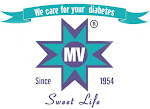Ms Thameena,
Dietitian,MVH
Hunger and malnutrition , rapid changes in the diets and lifestyles, "nutritional transition", where traditional foods such as cereals and potatoes are increasingly being replaced by diets that are richer in added sugars and animal fats, increased caloric content of food ,increased fat content, excessive consumption of meat, dairy products, and eggs, individual risk factors such as unhealthy diets, low levels of exercise, and genetic factors are all responsible for the high levels of chronic diseases .
The risk of developing chronic disease can be reduced at any age, therefore people of all ages can benefit by eating healthy food, maintaining optimum weight, and exercising.
A well balanced diet consisting of different food groups as well as increased physical activity can prevent chronic diseases.
‘Safe range’ guideline to healthy eating


- Total fat intake should be 15 to 30% of total dietary energy intake.
- Free sugars found in soft drinks and many processed foods should be less than 10% of total energy intake.
- Consume at least 400g of fruits and vegetables per day. Along with wholegrain cereals this can provide sufficient fibre.
- The WHO also makes recommendations about body weight – in terms of Body Mass Index (BMI) – and physical activity.
- Body Mass Index (BMI) is a simple index of weight-for-height that is commonly used to classify underweight, overweight and obesity in adults.
- For good cardiovascular health, at least 30 minutes of moderate physical activity such as brisk walking every day is recommended for people of all ages.
- Certain types of foods and eating habits such as snacking, binge-eating, and eating out can contribute to excessive weight gain and obesity.
- Regular physical exercise
- High dietary fibre intake
- Healthy food and activity choices at home, school and workplace
…provide protection from obesity
Some factors that may increase the risk:
- Sedentary lifestyles, particularly sedentary occupations and recreational activities such as watching television
- Large portion sizes
- High intake of drinks containing added sugars
Prevent obesity by encouraging healthy habits early in life. Maintain a healthy Body Mass Index and control waist size. Do moderate to high level of regular physical activity such as walking for one hour per day, and limit consumption of foods and drinks that contain high amounts of fats and sugars.
The number of cases of diabetes is currently estimated to be around 150 million worldwide, but that number is expected to double by 2025.







Inactive lifestyles and excessive weight gain increase the risk of type 2 diabetes, especially when excess fat is stored in the abdomen.
Efforts to prevent excessive weight gain and cardiovascular disease can also reduce the risk of developing diabetes. Measures include maintaining a healthy weight, engaging in at least one hour of moderate physical activity every day, consuming sufficient fibre from fruits, vegetables and wholegrain cereals, and limiting consumption of saturated fats.
Cardiovascular Disease


Certain dietary fats, especially those that are commonly found in dairy products, meat and hydrogenated oils increase the risk of cardiovascular disease. Other dietary fats, such as those found in soybean and sunflower oils, can lower the risk of cardiovascular disease. Fish oil which is found in fatty fish is also beneficial.
A high intake of salt can increase blood pressure and the risk of stroke and coronary heart disease, whereas eating a diet high in fibre and wholegrain cereals can reduce the risk of coronary heart disease.
A high intake of fruits, vegetables, and fish can contribute to good cardiovascular health and reduce the risk of developing certain cardiovascular diseases. Alcohol consumption should be limited.
Prevent cardiovascular disease
- Limit intake of dairy products, meat and cooking fats such as clarified butter or ghee.
- Eat 400 to 500g of fruits and vegetables every day
- Have fish once or twice a week.
- Restrict salt intake to less than 5 g per day and
- Exercise for at least 30 minutes a day
Dental disease
Diet is an important factor that can cause dental disease. Caries develop due to the presence of sugars from the diet and bacteria. The tooth surface can also be attacked by acids from some foods and drinks.
Sugar consumption is the most important factor for dental caries. Studies have found a strong link between the amount and frequency of sugar consumption and the development of caries.
Eating certain foods, such as cheese, may stimulate secretion of saliva which can protect against the development of dental caries. Breastfed babies tend to have less dental caries in early childhood than babies fed on formula milk. ..
To reduce the risk of dental diseases:
- Cut down on the amount and frequency of consumption of sugar,
- Ensure adequate exposure to fluoride, and
- Avoid certain nutrient deficiencies.
Osteoporosis
Osteoporosis is a disease affecting millions of people around the world that leads to brittle bones that break easily. The risk of osteoporosis increases with age and can lead to illness, disability, and even premature death.
Calcium and vitamin D deficiencies increase the risk of osteoporosis in older people. A healthy diet, increased sunlight exposure, increased physical activity, eating more fruit and vegetables, and consuming less alcohol and salt can reduce the risk.
In short, a lifestyle combining physical activity with healthy food is the best way to reduce the risk of developing chronic diseases.





















No comments:
Post a Comment